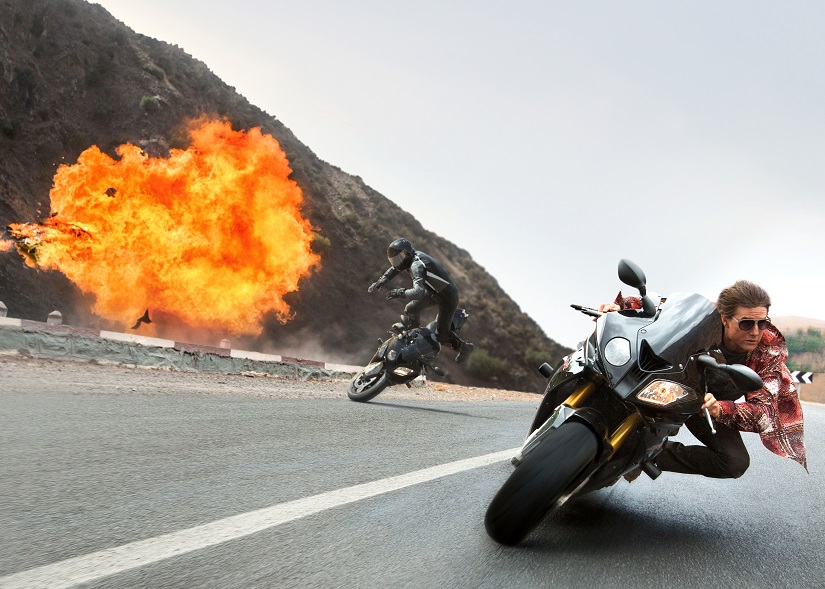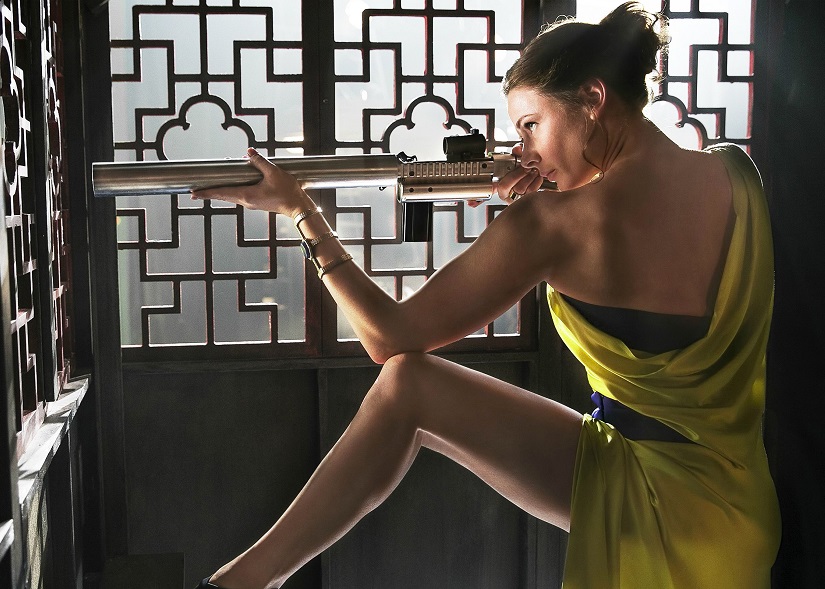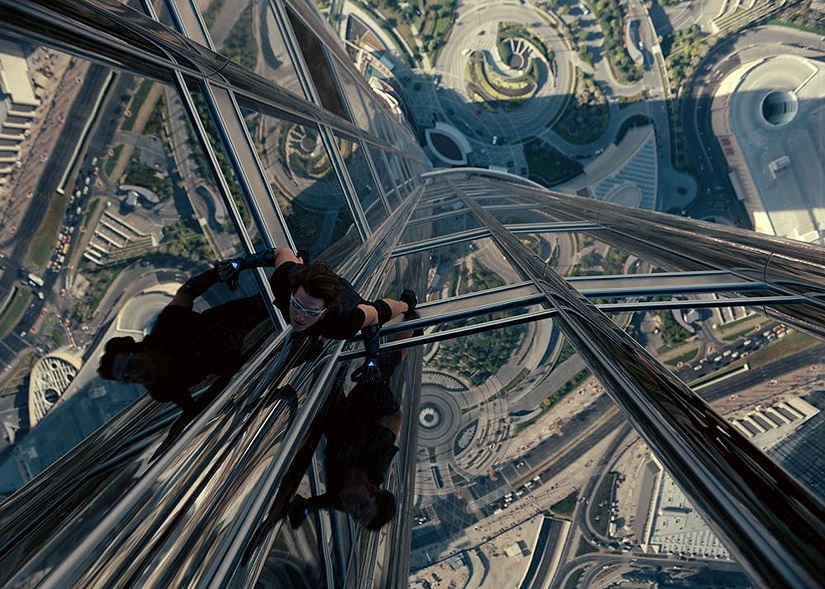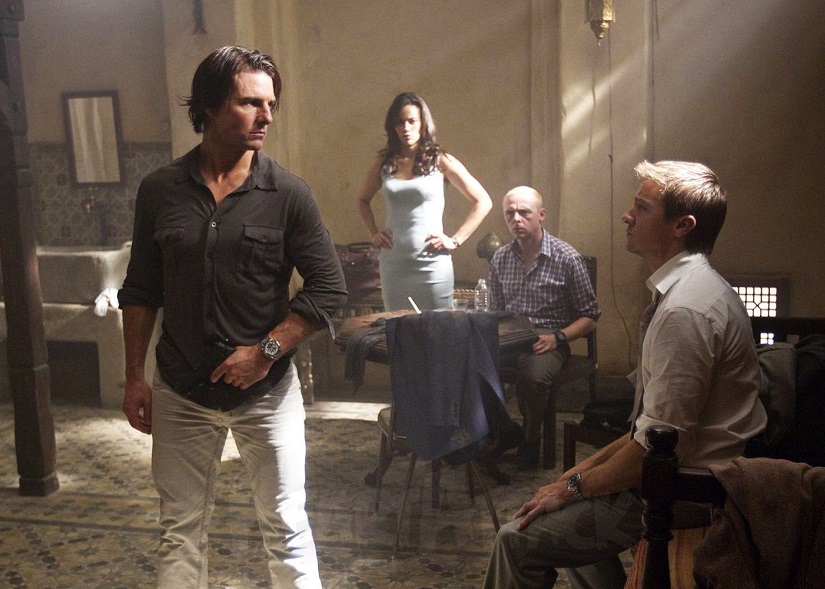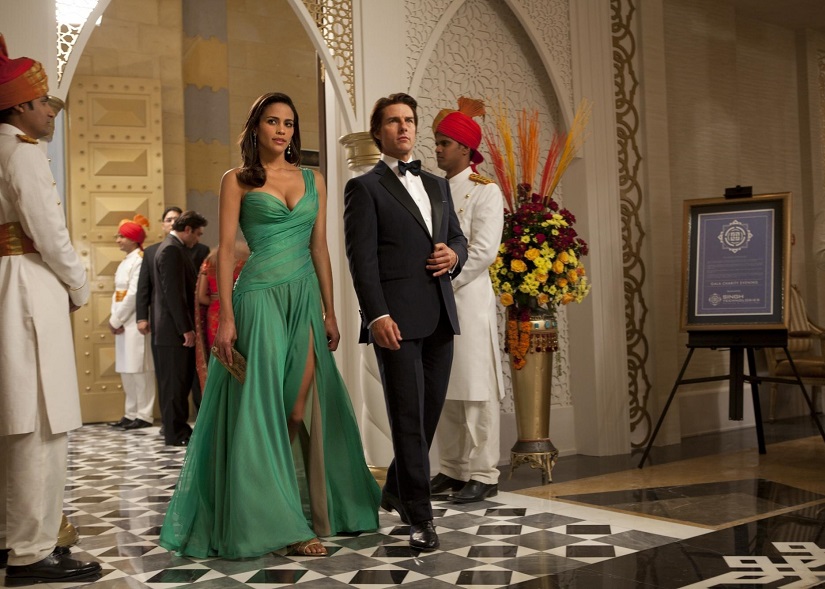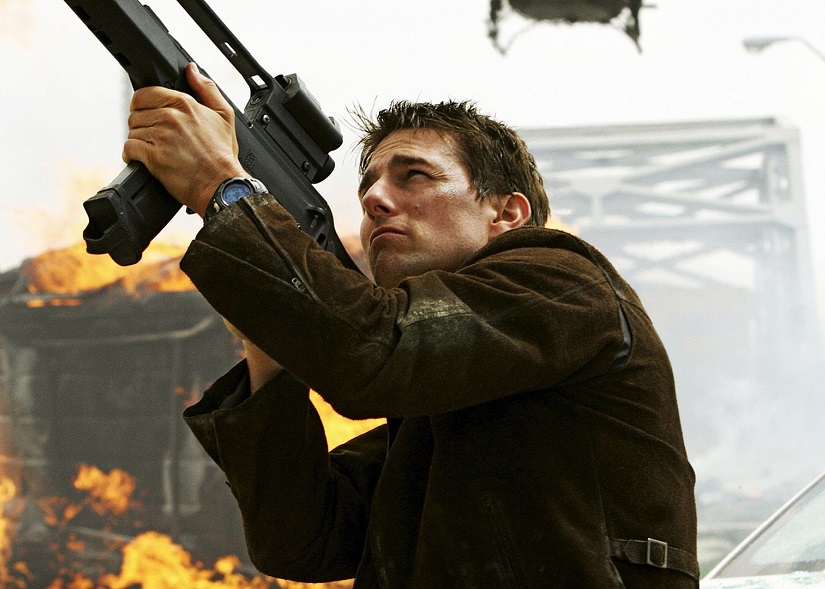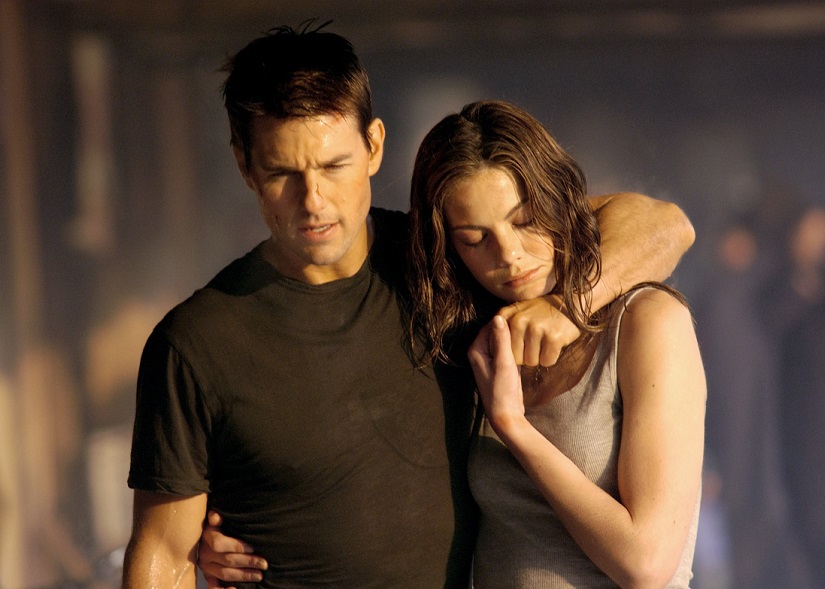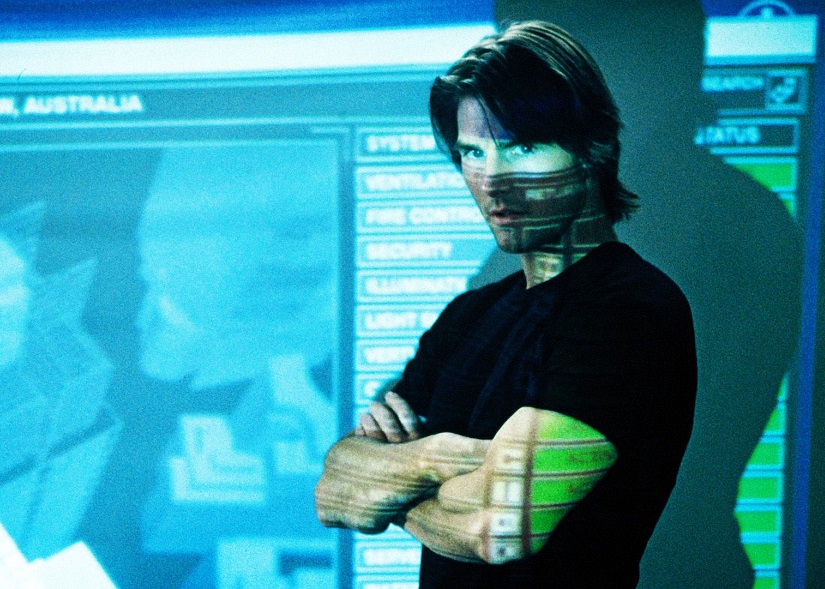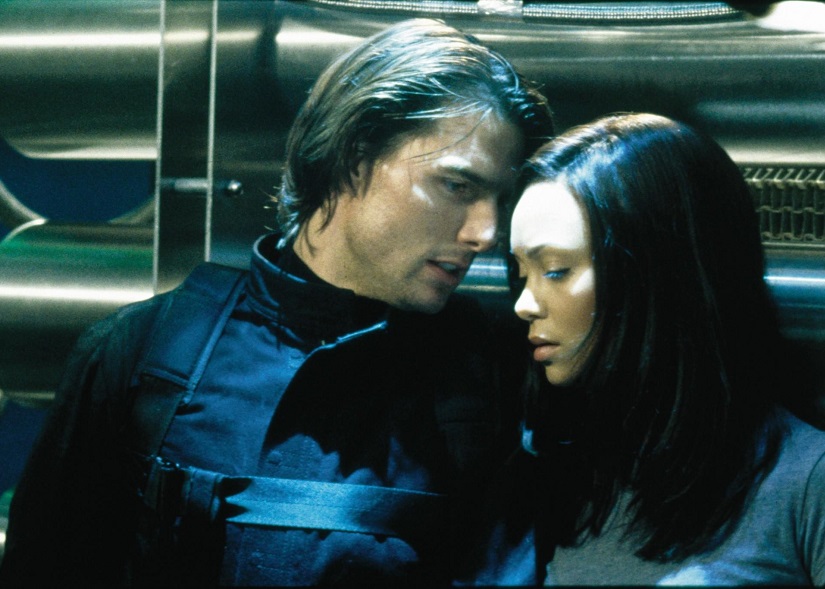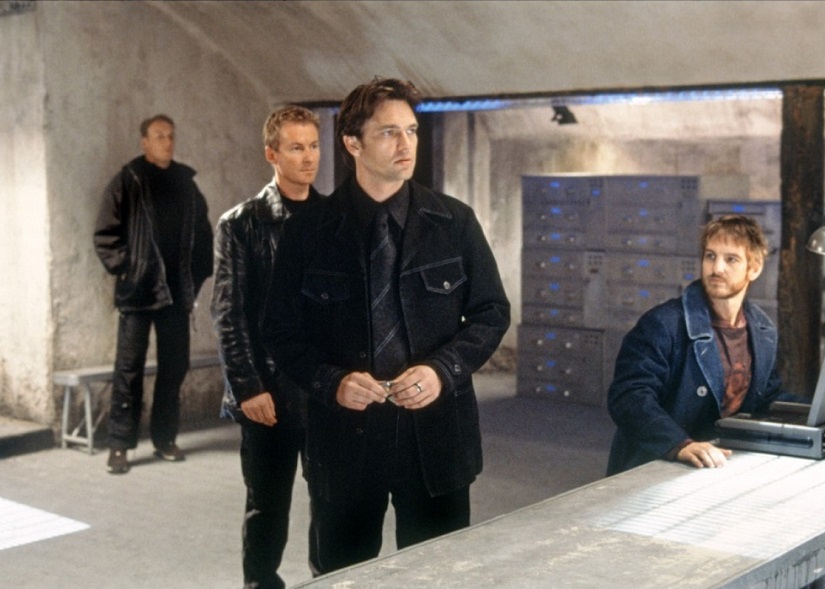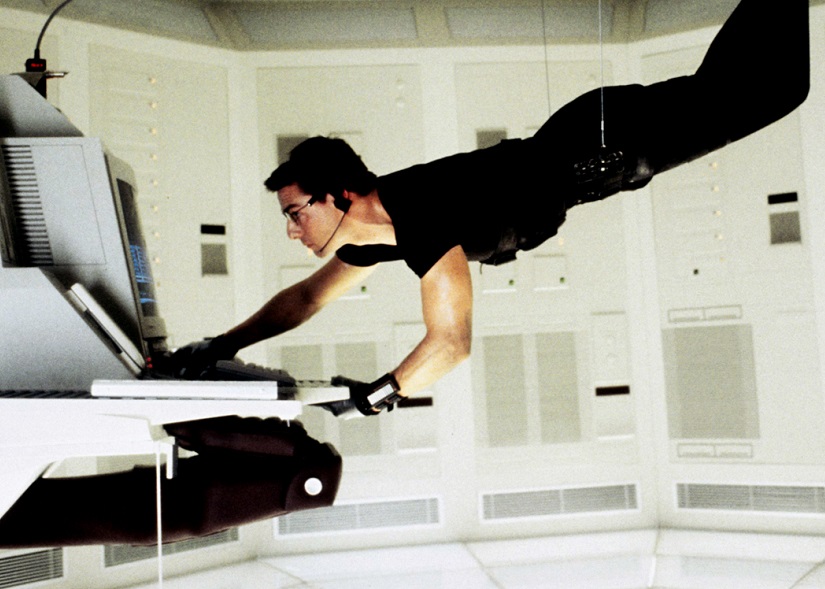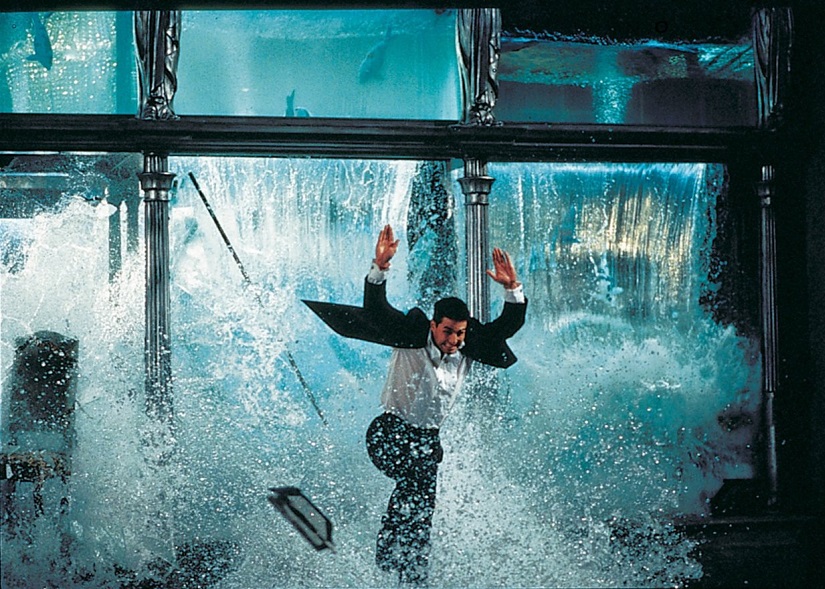[Review] Mission: Impossible - Rogue Nation
In my recaps of the Mission: Impossible movies last week, I postulated that even in this most unpredictable of series, where tone, narrative and character are defined not by formula but the vision of whomever happens to be behind the camera, the movies tend to alternate between the character-driven suspense of the first and third entries, and the live action cartoons of the second and fourth. From the trailers, you'd suspect Rogue Nation was set to break the cycle and consolidate the successes of Brad Bird's Ghost Protocol. In fact, Rogue Nation is every bit as much the product of its director as previous movies and its successes and failures are far more akin to those of the odd-numbered entries than the even ones.
McQuarrie's voice is not as immediately clear as that of De Palma, or Woo, or Abrams, or Bird, but there are clear traces of his previous work in Rogue Nation's DNA. There's the twisting allegiances of Usual Suspects, which he wrote; the slow-burning suspense and disenchantment with politics and governments from Valkyrie; a hint of The Tourist's globe-trotting caper; more than a splash of Jack Reacher's love of crunching physical violence, both personal and mechanical. That these traits are more disparate than those belonging to previous series directors leads to the movie struggling for a coherent tone, even if several of its individual notes are terrific. Somehow, that inconsistency allows it to be both its own thing and also the closest thing yet produced to a 'typical' Mission: Impossible movie.
[youtube id="pXwaKB7YOjw"]
Mission: Impossible - Rogue Nation
Director: Christopher McQuarrie
Rating: PG-13
Release Date: July 31st 2015
The much-trailed airplane stunt kicks off the movie and summarises much of why there continues to be a fondness for the series, sometimes in spite of itself. The entire sequence has next to nothing to do with the rest of the movie, but combines a real sense of danger and adrenaline with a winking sense of humour acknowledging the silliness of what is happening without undermining it. That dedication to over-the-top physical stuntwork generates and deserves huge amounts of goodwill, especially with Tom Cruise's fervent dedication to performing every fresh act of lunacy himself. It's a lost art these days, rarely seen since Roger Moore's tenure of the James Bond series, even if Moore let his stuntman do much of the hard graft. As an aside, it's interesting how much Rogue Nation, intentionally or not, draws on precedents from the Bond movies. The plane stunt is a larger scale version of similar efforts from Octopussy and Living Daylights, for instance, while aficionados of both series will spot a number of recurring motifs, not least in the villainous Syndicate being a brazen analogue for SPECTRE. With that organisation soon to make a return, you have to wonder if Cruise and McQuarrie hoped to nip in and bag a bit of the glory first.
After that typically spectacular intro, the movie settles down into something more unexpectedly low-key. Aside from an overextended car and bike chase somewhere around the midpoint, most of the major set-pieces revolve around tension and one-on-one fights rather than escalating the spectacle. The decision is an admirable one, but doesn't quite pay off as fully as it could as a result of shortcomings elsewhere. The first half is significantly more compelling for the fact that the Syndicate and its operatives and motives remain mysterious and unknown to both audience and protagonist. Ethan Hunt, going rogue for the fourth time in five movies in a gimmick that has gone beyond eye-rolling into resigned acceptance, feels out of his depth and struggling to keep up with enemies he's unable to even clearly identify, imbuing him with a sense of the underdog despite his superhuman physical capabilities. The apex of this, in both the high point of the movie and one of the series' strongest scenes, is his attempt to stop a Syndicate hit on the Austrian chancellor during a performance of Turandot at the Viennese opera. It's a perfectly paced sequence where a number of players of uncertain allegiances and motives play off each other in perfect musical and thematic timing to the opera taking place in the background.
In the middle of it all is Rebecca Ferguson's immaculately named Ilsa Faust, the double-triple-maybe-quadruple agent who is the movie's best developed and most engaging character by far. As the series continues to struggle to find any sort of identity for Hunt beyond 'Tom Cruise jumping off stuff', Ilsa is ferociously powerful, fiercely intelligent and vulnerable in a way which allows her to be grateful for help without making it seem as though she couldn't, in a pinch, save her own hide on the back of her talents. She drives the narrative far more than Hunt, who, like Max Rockatansky, mostly follows her lead and serves as a useful tool for disentangling her from the zero-sum situation into which she has been placed. Ferguson's performance enhances an already complex role, distinguishing between the character's professional deviousness and her personal humour and pragmatism. Aside from a strange two or three minutes where the camera twice lingers slightly too long on her bottom, her sexiness is played to emphasize her strength and is always under her control. In the end it's a relief she ends up friendzoning* the ever sexless Hunt, who is nowhere near as interesting a leading man as she deserves, no matter how often the movie farcically tells us he is 'the personification of destiny'.
That Ilsa represents one of so many strong elements which the movie puts into play in its first half only emphasizes how disappointing it is when they all start to fall in on each other in the second. Ilsa virtually holds the movie up on her own, but even she gets sidelined more and more as the screenwriters remember that Hunt, unfortunately, should probably start participating in the narrative of his own movie. The plot's unknown elements are a rich source of intrigue early on, but undermined with every new reveal. The Syndicate's motives are imprecise at best, their plan barely substantial enough to merit the use of the word, and their numbers seemingly comprise little more than leader Solomon Lane (Sean Harris) and a few bodyguards. Where the plotlessness of Ghost Protocol worked because that movie was basically a cartoon, here we are asked to take the stakes seriously, making the myriad logical fallacies and situational contrivances all the more apparent. A late scene in which Hunt and co. apprehend the British Prime Minister at a charity auction devolves into a non-stop stream of exposition, none of it enhancing the plot or characters and tying itself in knots to emphasize poorly developed themes while contriving to explain why none of the characters are going to be arrested immediately afterwards.
As the main villain, Solomon Lane is seemingly aiming for something along the lines of the psychopathic bureaucrat that Philip Seymour Hoffman embodied so perfectly in Mission: Impossible 3, but instead comes across as an annoying, whiny doofus, achieving what little he does through the ineptitude of others rather than his own competence. The bafflingly ridiculous manner in which he meets his fate, the last note of an already anti-climactic climax, is one of a series of misjudgments casting a character intended as creepy and sinister as meek and ineffectual instead. The movie never descends into being outright bad, but its inability to produce satisfying or even logical answers to the questions so enigmatically posed lead to the whole thing coming perilously close to collapse. As the first movie proves, low-key suspense can be an extremely effective tool in the action genre, but only when the writing is strong enough to fill the gap left by the absence of bombast, which is sadly not the case here. Ferguson's Ilsa is worth the price of admission on her own and then some, to the extent that I'd be far more excited about her getting a spin-off of her own than a sixth entry in a series which continues to only just delight more than it frustrates.
*And yes, before someone asks, I am using the notion of 'friendzoning' entirely sarcastically.
Series Recap - Mission: Impossible - Ghost Protocol (2011)
After Mission: Impossible 3's straight-faced, character-driven approach made a messy attempt at returning the series to the first movie's cereberal roots, Ghost Protocol seems a natural companion piece to Mission: Impossible II. For one thing, Ethan's hair has grown long again, while the movie adopts the same all bombast, all the time style which John Woo made so intolerable through endless empty flourishes and Robert Towne's lousy screenplay. If M:I3 was a lesser imitiation of the original, though, Ghost Protocol director Brad Bird takes the philosophy of M:I II and makes the movie that movie should have been. There's no nonsense about Scottish doppelgangers, disquisitions about heroes and villains or ridiculous showboating here. Instead, the fourth entry in the series has nothing more on its mind than delivering two hours of relentless entertainment. It succeeds admirably.
Perhaps the most telling difference between this and M:I II is that where Woo's movie came across as an extended Tom Cruise ego trip, Ghost Protocol delights in how much physical damage it can inflict on its star. Bird turns Hunt into Wile E. Coyote, a figure whose absence of personality matters not in the slightest when the real pleasure is watching him get pulverised on a semi-regular basis. This in turn makes him quite a bit more likeable than the two previous movies, if only because his sheer persistence in the face of constant physical trauma becomes amusingly, morbidly admirable. Rarely has even the boldest action movie climax been so unashamedly Looney Tunes-esque as the ridiculous showdown in a high-tech car park, culminating in Hunt driving a car down a straight drop of several floors to the concrete ground.
The plot is so thin as to barely exist. The IMF team is framed and disavowed following the destruction of the Kremlin, for which responsibility lies with Kurt Hendricks, a man determined to start a nuclear war for reasons no-one can entirely fathom. Hendricks barely appears at all, to the extent I'd mostly forgotten there even was a main villain for most of the movie's running time. Bird uses plot as little more than a loose framework around which to build a set-piece delivery machine, churning out one action sequence after another with little interest in developing the narrative in any meaningful way. Where that might be problematic in lesser hands, Bird shoots each sequence with such freewheeling energy that it's a joy just to be taken along for the ride. Making his live action directorial debut off the back of Pixar's The Incredibles and Ratatouille, there's a clear cartoonish influence on the way he gleefully abandons reality in search of squeezing every drop of entertainment and comedy value out of each frame.
The Burj Khalifa sequence, the apex of the series' love of vertical action, is the most thrilling of the lot and among the most astounding movie set-pieces of the decade so far. Benefiting enormously from Cruise's devotion to performing every stunt himself, Bird delights in evoking the vertiginous heights Hunt is manoeuvering above. Having Hunt climb the side of the world's tallest building isn't enough, of course, so the movie throws in a number of terrific visual gags surrounding his malfunctioning adhesive gloves and a variant on the fulcrum technique used for a skyscraper break-in in the last movie, here employed in an insane attempt at returning to the hotel room from whence he came and naturally faceplanting a window on the way. Anyone who missed seeing it in IMAX should be kicking themselves, but it is shot so well as to work almost as effectively on the small screen. After the overblown blue-and-oranges of M:I3, Robert Elswit's cinematography puts a strong emphasis on bringing out the colour and vibrancy of each location. Ghost Protocol is frequently gorgeous to look at and captures the distinctive identity of each destination in a way Woo and Abrams so comprehensively failed at.
What anchors the movie is the strongest team dynamic of the series to date. Simon Pegg returns from M:I3 and is given far greater prominence as the movie's comic relief gadget maestro. With Ving Rhames' stalwart Luther held back until a cameo at the end, Jeremy Renner and Paula Patton are the newcomers making up the rest of the team. Renner is wonderful as Brandt, a grumpier, more reluctant version of the Ethan Hunt from the first movie and something approaching a voice of sanity in a world gone utterly bananas. His chemistry with Pegg and Cruise is immediately endearing, even if his links to Hunt's past feel a little shoehorned in. Paula Patton's Jane Carter gets a slither of backstory, immediately making her the series' best developed female character. While Patton isn't an especially strong actress, she looks believeable tough - her kicking off her heels before going into battle is a small, badass wonder - and rocks a cocktail dress to brain-melting levels of hotness.
The movie's approach to continuity is interesting, although not altogether successful. The reveal that Brandt was on the security detail assigned to protect Hunt's wife, Julie, when she was ostensibly killed just sort of sits there, serving little purpose until a faintly sweet coda in the final scene. The question of what actually happened to her is brought up a number of times and drags the pace down each time. I appreciate the movie not simply ignoring its predecessor's potentially difficult resolution, but a shorter, sharper explanation would have been more than sufficient. A callback to the manner in which Hunt is taken to see Max in the first movie is a fun if nonsensical nod, but can't help but feel disappointing when the imperious Vanessa Redgrave fails to turn up. That Hunt instead turns out to be making a call to the man he freed from a Russian prison (to the tune of 'Ain't That A Kick In The Head', no less) in the first act pays off that foreshadowing reasonably well, but if you're going to tease one of the series' most vivid characters, you'd damn well better deliver. Much better is how the movie's final line is used to slyly set up the events of Rogue Nation, which will have a hell of a job on its hands if it's to raise the bar on Ghost Protocol's stupendous action extravaganza.
Series Recap - Mission: Impossible 3 (2006)
Following the widely-derided Mission: Impossible 2, the series remained dormant for a full six years before JJ Abrams, then best known for his work on TV spy series Alias, was brought onboard to try and resurrect it. Star Tom Cruise was also in need of a vehicle to win back his place in the heart of moviegoers, having undergone a series of PR disasters after unceremoniously firing his agent in 2004. Despite still being a draw at the box-office, with such successes as Minority Report, The Last Samurai and War Of The Worlds under his belt, his star's public persona was seen as increasingly alienating, with his close support of Scientology becoming ever more pronounced.
There's a clear sense in Mission: Impossible 3 of drawing back from the garish excesses of the second movie to something more intimate and character-driven. Having recently married Katie Holmes and with a child on the way, one suspects that public cynicism regarding the authenticity of Cruise's family life may have played some part in the direction that M:I3 was taken. That may give you some clue as to how well it turned out.
Anyone familiar with Alias will immediately recognise why Abrams was brought onto the movie. The plot bears a number of resemblances to motifs employed repeatedly throughout the series, most notably opening in media res and featuring a protagonist struggling to keep his professional life as a spy separate from his personal life. Following his escapades spanking Dougray Scott around in Australia, Ethan Hunt is, in fact, no longer an active field agent but an instructor. His protégé, Lindsey Farris (Keri Russell, playing against type), is kidnapped while investigating an arms dealer, Owen Davian, who is trying to get his hands on a mysterious weapon known as the Rabbit's Foot. Hunt has also found himself something approaching a steady home life, though his fiancée, Julie (Michelle Monaghan), is entirely unaware that his real job is considerably less mundane than the post she believes he's holding down at the Department of Transportation.
If that's seems like a lot of backstory to get through before the plot even begins, you'd be right. The movie starts with the series' most powerful cold open, in which Davian holds a gun to Julie's head and threatens to kill her if Hunt doesn't tell him the location of the Rabbit's Foot by the time he's finished counting down from ten. This short sequence packs in a huge amount of information without betraying the intensity of the scene. While gripped by the sight of the normally cool-headed Hunt descend into pleading desperation as each of his negotiating tactics fail miserably, we're subconsciously absorbing small details (Hunt having someone extremely close to him under threat, the value of the Rabbit's Foot, Hoffman as the villain, etc) to be expanded upon later.
Unfortunately the effortless power of that opening scene doesn't expand to the rest of the film. The plot is heavily streamlined in order to keep things moving, which wouldn't be so bad were so much essential information not left missing or underdeveloped. We have no idea how Hunt and Julia met or why they're attracted to each other beyond physical appearance, or even who they really are as people. Knowing so little about the two characters makes investing in their relationship a real mission: impossible (badum tish) as neither is given the slightest bit of depth either individually or as a couple. Monaghan's natural sweetness almost pulls it off on her end, but Cruise has never seemed more robotic or unnatural. The scene in which Hunt throws a party to meet Julie's family shows him descending into outright creepiness, as he starts reading people's lips and injecting himself into their conversations. As mentioned previously, playing romance has never been Cruise's strong point and the straight-faced nature of his scenes with Monaghan make the uncanny valley of his performance as Likeable Human Male all the more pronounced.
The spy stuff is more interesting by default, but still feels strangely hollow. The heavy use of colour grading in any scene set in an urban or industrial environment overemphasizes the blues and oranges to such an extent that the movie often has the look of a particularly offputting DVD cover. Abrams' direction is acceptable, but while it's a relief not to endure any more of Woo's tiresome flourishes, his inexperience on film is painfully obvious. He shoots with the technical precision required on television, but fails to establish any sense of grandeur. The entire movie feels like a (remarkably expensive) feature-length series finale, only becoming truly cinematic in the terrific sequence in which Hunt's convoy, carrying the captive Damian, is assaulted by air while crossing the Chesapeake Bay Bridge-Tunnel. The narrative streamlining also makes it difficult to invest in the plot, as keeping the nature of the Rabbit's Foot secret means there's no sense of the scale of the threat in question. Simon Pegg's Benji postulates a theory about it being the anti-God, but the suggestion is so over-the-top, and immediately dismissed by the character himself, as to be nothing more than empty hyperbole. The intention is obviously to keep the focus on the personal stakes for Hunt after Julie is kidnapped, an admirable goal which flounders due to that relationship being similarly underwritten.
What does work is Philip Seymour Hoffman's performance as Davian. Rather than going full-on with boorish villain theatrics, Hoffman takes an unexpected road by imbuing Davian with a chilling, sociopathic stillness. He may not be the most physically dangerous antagonist Hunt has faced, but he's aware that the morality restricting the actions of Hunt's team makes him effectively invincible. His calmness is a sinister reflection of his absolute confidence and amorality, making him a grippingly atypical foe for the genre. Also fun is the set-piece in which Hunt breaks into the Vatican, which features a number of strong visual gags (and a mesmerising effect in which Hunt's Hoffman mask seemlessly transforms him into Hoffman) and an interesting location missing from the factory/skyscraper infiltrations which make up two of the movie's other major set-pieces. It's just a shame Hunt's team suffers the depth deficiency which diminishes all the movie's major characters, though there's at least a genuine sense of friendship between Hunt and his three-time partner Luther (Ving Rhames), while Maggie Q is just natural enough in her performance as Zhen Li not to disappear as thoroughly as Jonathan Rhys Meyers' Declan, who is notably solely for his terrible Irish accent.
The movie rediscovers its verve a little for the Shanghai-based climax, but even then struggles to elevate itself to heights above forgettable adequacy. True, that's a huge step-up from M:I II, but hardly the sort of recommendation needed to revive a series struggling for relevancy in the wake of the hugely successful Jason Bourne movies and Daniel Craig's soon-to-be-lauded debut as James Bond in Casino Royale. Fortunately, the fourth entry in the series, Ghost Protocol, would find in Brad Bird a director capable of marshalling the series' disparate tones into something more enjoyable and distinctly its own. Check back tomorrow for the final entry in our series recap.
Series Recap - Mission: Impossible 2 (2000)
While Brian De Palma's Mission: Impossible was a financial and criticial success, questions about its hard-to-follow plot were seemingly taken to heart when producers Tom Cruise and Paula Wagner sought to redirect the sequel away from the original's atmospheric blend of summer blockbuster and old-school action thriller and into more unashamedly spectacular action territory. The hot action director at the time was John Woo, coming off the back off a number of successful American ventures after establishing his name with the likes of The Killer and Hard Target in his native Hong Kong.
The kindest thing that can be said about Mission: Impossible 2 is that it's sort of interesting for being a movie which bears virtually no resemblance at all, in plot, characters, tone or visuals, to its predecessor. Cruise's character may be once again called Ethan Hunt, but to all intents and purposes, the protagonists of the two films manage to be completely different men despite both being largely blank slates in terms of personality. Woo's melodramatic style, matching heightened action with ludicrously hammy symbolism and near-abusive quantities of slow motion, certainly has its lurid charms when expressed in full, self-mocking regalia - see the wonderfully barmy Face/Off - but is made instantly insufferable by being used as a misguided tool to enhance the cool factor of its star.
Every frame of Mission: Impossible 2 reeks of pandering to megastar Cruise's ego. Woo's camera is never shy of zooming in at just the right time to remind the audience of the actor's toughness, rebelliousness, sensitivity, or just for one more look at that sexy, sexy Tomface. Having been more intellectual than fighter in the previous movie, Hunt grew his hair into an Aaron Carter mop in the interim and realised thinking was for dorks. After all, why strain the ol' brain when the possibility exists to instead thump someone in the face with a flying kick, or engage in a little motorbike foreplay with the Scottish doppelganger with whom you share a girlfriend? To describe the movie as substance-free is an insult to things which don't exist. It's so monumentally vapid and self-involved that it makes existing things want to disappear until it's all over.
The small moments of irony which do sneak through are among the movie's most enjoyable, although that's not saying much. It could be suggested that Woo was trying parody a certain kind of overwrought, star-driver blockbuster, but even if true, the few moments in which the satire registers are greatly outweighed by its extensive pandering to that same formula. Villain Sean Ambrose, played with all the toughness of a wet flannel by Dougray Scott, is supposed to be the anti-Ethan, but Ethan himself is such a non-entity that Ambrose himself just comes across as a preening, petulant pronk. His two moments of success both come in mocking Ethan, once describing how the hardest part of imitating him - more on that in a moment - was having to "grin incessantly for fifteen minutes" (more a jab at Cruise than Hunt) and later in contrasting his own 'kill first, think later' approach with Hunt's eagerness to perform "some aerobatic insanity before [risking] a single hair on a guard's head". It's worth noting that this is the first movie in which Hunt is shown performing anything like aerobatics, and while he was undeniably something of a pacifist in the first movie, here his approach is every bit as driven by guns and fists (steady) as Ambrose.
Leaving aside Scott's flaccid performance, what little sense of danger Ambrose might have possessed is dissipated the moment he's shown to be so blindly lovestruck by his ex-girlfriend, Nyah, that he willingly invites her into his lair despite it being such an obvious trap that he himself notes the contrivance of the whole scenario. The risk doesn't matter, he explains to his bodyguard, Stamp (played by Richard Roxburgh), because he knows she's a snitch and will get rid once he's bored of having sex with her. If that doesn't sound like an altogether honourable way of handling a female character, it's as good as it gets for poor Thandie Newton. The first scene positions Nyah as a master thief, only for those skills (bar one instance of straightforward pickpocketing) to be consciously discarded in favour of making her the rope in a tug of war between hero and villain over who gets to have sex with her. Like many 'strong female characters', she does all the sassy posturing supposedly proving her an equal to the menfolk - although if that were true, she wouldn't be required to prove it - only for the narrative to reduce her to a brainless plaything for Scott and Cruise, whose career-long inability to convincingly play romance is emphasized to a painful degree here with such clunking lines as "My God, you're beautiful". I do like her name though - Srta Nyah Nordoff-Hall - so that's something.
Let's also talk about the face masks, a fun little gimmick in the first movie but used incessantly here. The plot starts off with Ambrose 'doubling', needlessly, for Hunt, then continues in that vein throughout, with everyone seemingly having a mask of everyone else just in case it happens to come in handy. Yes, it's supposed to emphasize Ambrose and Hunt being the same person on opposite ends of the moral compass - much like the pathogen and antidote making up the movie's Macguffin and described by Dr. Nekhorvich, their Einstein-y creator, as villain and hero - but such symbolism doesn't follow through when you have Hunt imitating Nekhorvich and Stamp as well. What's that supposed to symbolise? Instead it functions as lazy shorthand to engineer some decidedly unshocking twists into a plot which could not be more rote if it tried: Ambrose wants to loose the Chimera virus on Sydney to increase the value of the shares he owns in the company manufacturing the antidote.
Sydney also makes a resoundingly dull location, having so little identity on-screen that the best settings the movie can muster up are a racetrack, a skyscraper and a bunker, with a remote sheep farm thrown in for good measure. The city dominates the movie's running time, but there's so little sign of any local history, unique architecture or culture that a very brief excursion through Seville offers infinitely more flavour in a tiny fraction of the time. It's a hollow location for a thoroughly hollow movie, a stark contrast in every way to its complex, compelling predecessor. Action movies don't need to be intelligent or even make a great deal of sense, but do need to offer something more than an excuse for the star to posture and prance about the place trying to remind everyone of what a badass he thinks he is, even when the embarrassing transparency of the act is immediately apparent to everyone forced to endure it.
It's no surprise M:I II (yes, that's the official abbreviation) marked the start of a downturn in Cruise's career, to the extent that when the series' second sequel was released a full six years later, his deteriorating public image was seen to have a negative impact on the movie's marketing. Check back here for my coverage of that movie tomorrow.
Series Recap - Mission: Impossible (1996)
Ahead of the release of Mission Impossible: Rogue Nation this Friday, I'm going to be looking back at the four previous installments in the series to chart the evolution from one film to the next and see how well they individually hold up. The M:I movies are especially interesting in this regard because where most action blockbuster franchises settle into a bland uniformity once the sequels start churning out, each entry in this series is most notable for how different they all are from each other. Even the Bond series, which over its fifty-odd year history has reinvented itself time and time again, does not come close to the tonal disparity existing between each new M:I release.
The original, directed by Brian De Palma, remains my favourite and the most tonally distinct of the four to date. Where John Woo's sequel, which I'll cover tomorrow, turned the series' focus almost exclusively to big-budget action, De Palma's Mission: Impossible is more interested in plot and atmosphere than large-scale shootouts or big action set-pieces. True, the climax in the Channel Tunnel is as enjoyably loopy as anything which would follow, but the film leading up to it channels the intricately plotted Cold War spy thrillers of the '70s rather than the typical blockbuster fare of the time.
The plot starts off with a mission to retrieve a leaked list of undercover agents going horribly wrong, leaving Ethan Hunt the only surviving member of his team. Under suspicion of being a traitor, Hunt sets about following leads to uncover the person who really betrayed him. At the time, the movie was mockingly referred to as Mission: Impenetrable for its convoluted storytelling, possibly one of the reasons why subsequent entries in the series have kept plotting to a bare minimum. De Palma's film has its share of twists, but isn't especially difficult to follow for anyone paying attention. There are perhaps a few too many ancilliary details introduced around the margins, but the plot unravels for the most part in fairly straightforward fashion.
If anything, that slight overcomplexity feeds nicely into the spirit of the genre that the film most closely emulates. The '70s saw the thriller genre become heavily politicised, reflecting the paranoid escalation of the Cold War and the sense that even one's own government was not to be trusted. The heroes of the time frequently found themselves questioning old loyalties and struggling to comprehend the far-reaching implications of the situations they found themselves in. Hunt starts out as the quintessential company man, loyal to a fault to his mission and his team, yet finds himself having to collaborate with an arms dealer, Max, and steal from CIA Headquarters, in the movie's exquisitely tense signature scene, the very list he was initially assigned to protect. In other words, to prove his innocence he has to do exactly that which he was wrongfully accused of doing in the first place.
That level of moral complexity is something the series abandoned immediately afterwards, which is a shame since it elevates the material so compellingly here. De Palma has great fun playing with the tropes and visual stylings of the genre, creating a rich atmosphere which adapts to the changing mood of the narrative. The first act, in Prague, is drowning in Third Man-esque shadows as Hunt finds himself alone, in constant danger and straining to make sense of a puzzle for which he seems to be missing all the crucial pieces. As he is forced to compromise his old certainties to make progress, the dominant colour scheme shifts from deep black and blues to greys and browns, emphasizing the new world of moral murkiness that the movie inhabits. As his plans start to come together for the third act climax, so too does the movie become more boldly colourful.
De Palma's love of genre cinema made him a perfect fit not only for emulating the style of old-school thrillers, but subverting it as well. Turning Jim Phelps, the only character to carry over from the TV series, into the villain was one hell of a ballsy move, not to mention an immensely controversial one at the time, but plays brilliantly into the movie's themes of shifting loyalties and political cynicism. Casting Vanessa Redgrave as arms dealer Max was similarly inspired. Redgrave turned what could have been a rote and uninteresting supporting character in the hands of a man into something far more devilish. Just as James Bond's boss, M, had recently been recast as a woman in GoldenEye (1995), the female Max reflected the growing influence of women in all areas of society, while also subverting the femme fatale trope so beloved of the genre. Max is sensual and slyly predatory, using flirtation as both a tool to achieve her ends and a mask to cover her ruthlessness. She's exactly the sort of boldly defined supporting player that later movies have so noticeably lacked, especially with Redgrave, a character actress par excellence, finding just the right level of dry wit to leverage the movie's sometimes over-serious tone.
Max's experienced, manipulative sensuality exists in stark contrast to the youth and relative sexlessness of Tom Cruise's Hunt. Even across four movies, Hunt has never found much by way of personality, but that blank slate quality works in his favour here by stripping him of much of the overblown machismo blighting so many action heroes then and now. Cruise's portrayal skews closer here to the Jeremy Renner character from Ghost Protocol: a highly competent field agent whose primary skills are in analysis rather than action. Indeed, he barely kills anyone until the movie's end. This intelligence is emphasized in one of the movie's most inspired scenes. Phelps, having returned from the dead, recounts a falsified version of how he survived his apparent assassination at the beginning of the movie. Hunt vocally accepts the story, all while mentally mapping out what really happened and confirming Phelps as the traitor. It's an audacious piece of narrative trickery in which De Palma sets dialogue and visuals against each other to simultaneously advance the plot and enrich our appreciation of Hunt's talents.
While the series would certainly go on to have its share of successes, that this early subversive streak and focus on atmosphere and plot were so thoroughly abandoned is a great loss. Mission: Impossible is not a perfect film by any means, but is a more faithful and interesting adaptation of its source material than all which would follow, while also being unafraid to subvert it to create its own big screen identity. Cinema could do with more heroes like this early Ethan Hunt, a more intellectual, even slightly nerdy version of the generic action man he would turn into for the following movie.

